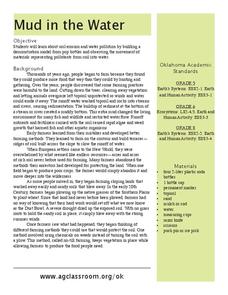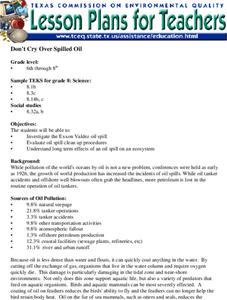Curated OER
Diversity Ecosystems
Young scholars work in teams to characterize their biomes and compare them to the biomes of the rest of the class. In this biomes lesson plan, students complete a bean activity, relate it to the diversity in biomes, and then research and...
Curated OER
Ocean Exploration: How Doea you Data Grow? (Grades 7-8)
Students explore fieldwork. In this seventh or eighth grade mathematics lesson, students watch a video on data collection in the field. Students use fieldwork to gather data about their school environment. ...
Curated OER
Is It Getting Hot In Here?
Students describe several factors and ways climate change could effect communities. In this climate change lesson students research climate change and complete a worksheet.
Curated OER
Alien Invasion
Learners research how alien species can change an ecosystem. In this coral reef lesson, students describe invasive species and site evidence how these species came to be invasive and what control measures are possible.
Curated OER
The Giant Barrel Sponge
Students study barrel sponges. In this science and art instructional activity, students discuss what sponges are, create their own sponge, and share what they created with the rest of the class.
Curated OER
Mud in the Water
Sixth graders investigate erosion. In this erosion lesson plan, 6th graders explore how farming changes the environment. Students construct an erosion model and research ways to protect the soil from excess mud generated by farming.
Curated OER
Scavenging the Sandy Shore
Young scholars explore oceanography by examining a beach. In this living things lesson, students define the terms abiotic and biotic and practice identifying living and non-living things that have been previously found on a beach. Young...
Curated OER
Water Quality Monitoring
Students comprehend the four parameters of water quality. They perform tests for salinity, dissolved oxygen, pH and clarity or turbidity. Students comprehend why scientists and environmental managers monitor water uality and aquatic...
Curated OER
TE Lesson: Caught in the Net
Students student the concept of bycatch, the act of unintentionally catching certain living creatures using fishing equipment. They determine the difference between bycatch and target creatures. They discover what species become bycatch...
Curated OER
Ocean Microstructure Lesson Plan
Students explore the microstructure of the ocean by analyzing graphs created by Dr. Mike Gregg of the University of Washington Applied Physics Laboratory during the EPIC 2001 research cruise on the Ronald H. Brown NOAA vessel.
Curated OER
DID YOU HELP CREATE THIS
Students examine whether their actions are positively or negatively affecting organisms and their habitats. They choose an animal to study then create a multimedia presentation including charts and graphs of data logger information and...
Curated OER
Coral Reefs Endangered
Students research where in the world coral reefs are located. In this ecology lesson, students create food chains and food web. They simulate growing coral reefs to understand their characteristics better.
Curated OER
Super Scientists Code
In this science worksheet, students use the key code on the right to unscramble each of the scientists. They also match each of the scientists found to their correct description.
Curated OER
Venom!
Students examine the nature of venom. They conduct an experiment to demonstrate how proteins such as venoms can be denatured using raw eggs, beakers, heated water, and compresses.
Curated OER
Make an Edible Coral Reef
Students create an edible coral reef out of food and candy. In this Science instructional activity, students explore what a coral reef is and the coral reef's importance to the ecosystem. Additionally, students discover the...
Curated OER
Creature Feature
Students research an animal, and create a video to share their information and pictures with the class.
Curated OER
Hide & Seek Butterflies
Students examine a variety of butterflies and discuss how they believe they get their color variations. In groups, they brainstorm the advantages and disadvantages of their color schemes. To end the lesson, they watch butterflies in...
Curated OER
Don't Cry Over Spilled Oil
Students study the Exxon Valdez Oil Spill while evaluating oil spill clean up activities. They discover the long term impact can have on an ecosystem by completing this experiment.
Curated OER
Survival in the Open Ocean
Students examine how scientists conduct pelagic research and identify pelagic predators as they study the open-ocean ecosystem. They discuss and conduct small group research of this environment in order to produce a presentation.
Curated OER
Understanding Estuaries
Learners work together to develop their own estuarine ecosystem in an aquarium. They observe the aquarium daily and record them in a notebook. They discuss the different interactions they see with the class.
Curated OER
Pollution Solution
Students explore the topic of oil pollution and how it affects the global ocean. They discuss oil spills in recent history and use problem solving skills to decide what strategies could be used to actually clean up an oil spill. Students...
Curated OER
Science: Dissolved Oxygen and Water Quality Sampling
Students perform tests to determine the level of oxygen dissolved in water. After examining a table displaying the temperature and solubility of water, they examine the three stages involved in the test. Upon completion, students explain...
Curated OER
Walking Whales
Eighth graders explore the theory of evolution of whales. In this walking whales lesson plan students study a reading packet, divide into groups and respond to given questions.
Curated OER
Loggerhead Nest Management Program
Students identify the sea turtle management documentary and complete an activity for each slide. They plot the location of nests laid on the island they patrol and discuss their rationale for management decisions. Finally, students...
Other popular searches
- Marine Animal
- Marine Animal Reproduction
- Marine Animal Taxonomy Game
- Marine Animal Games
- Marine Animal Adaptations
- Marine Animal Classification

























